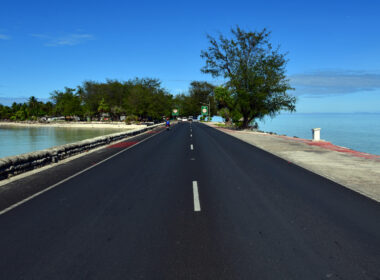More than 500 legal professionals from around the world descended on Siem Reap, Cambodia, in November for the 31st LAWASIA conference where environmental crime and the future of legal practice were the discussion items du jour.
There’s a certain energy generated when you throw 500 lawyers from around the world into tropical climes to tackle an agenda packed with contentious issues. Environmental crime, climate change refugees, foreign investment and influence in the Pacific, and the impact of artificial intelligence on the profession were just some of the topics debated and discussed over three days of packed sessions at the Hôtel Sofitel Angkor Phokeethra in Siem Reap in Cambodia.
Poolside networking, cocktail events and visits to Angkor Wat punctuated long days spent in academic debate and the convivial forging of cross-border relationships. As LAWASIA President Christopher Leong of Malaysia said at the closing ceremony, “The days were long, the nights were longer.”
The conference, however, was anything but a fiesta.
While delegates were embroiled in lively discussion, the executive council of LAWASIA was working hard to pass a resolution calling on all jurisdictions within the United Nations Economic and Social Commission for Asia and the Pacific (ESCAP) region that currently retain the death penalty – including China, Thailand and Pakistan – to review their policies on capital punishment and to implement a moratorium on the death penalty while carrying out this review.
In spite of a challenging diversity of views, laws and politics, the executive council – in the collegiate spirit which has come to define LAWASIA – was successful in passing the resolution.
“Some jurisdictions will say that [this resolution] is too little,” said a jubilant Leong at the closing ceremony, “but I must tell you that abolishing the death penalty is a journey.
“It is a journey Malaysia has started. It took quite a few years, a lot of effort and a lot of controversy. As president of the Malaysian Bar, I had to attend Parliament and brief members on the death penalty issue and why we should be moving towards abolishing it. We [said we] would accept, as a first step, if they were to repeal the mandatory death penalty and move towards a discretionary death penalty, and eventually abolition.
“All of the work in Malaysia is starting to pay off, because the new government of Malaysia, which took office on May 9 this year, has announced they will repeal and abolish the death penalty in Malaysia.”
The resulting cheers and applause confirmed Leong’s and the executive’s mandate.
“I would like to pay tribute to you, the LAWASIA members,” Leong said. “You have been there throughout the years. We are only able to do the work we do because you empower us to do it. There is no way your successive presidents could stand up and do what they do without knowing you are behind them. I thank you for that.”
A focus on the environment
Environmental law formed a significant part of the LAWASIA agenda this year, with four different sessions cutting across multiple environmental law issues, such as climate change refugees, settling disputes, and environmental crime.
Judith Preston from Sydney’s Macquarie University painted a stark picture of the scale of environmental crime within Asia and the Pacific during a session titled “Environmental Crime in the Indo-China Region”.
“Environmental crime poses a growing threat to peace, security, sustainable development and the environmental rule of law,” she said, referring to a 2016 joint UN-INTERPOL report titled Environment, Peace and Security: A Convergence of Threats.
“Abuse of the environment is the fourth-largest criminal activity in the world … The proceeds of crime are worth up to $US258 billion. Environmental crime is increasing by 5 to 7 per cent every year and converging with other forms of international crime, including corruption, counterfeiting, drug trafficking and cyber-crime.”
I would like to pay tribute to you, the LAWASIA members. You have been there throughout the years. We are only able to do the work we do because you empower us to do it.
CHRISTOPHER LEONG,
President, LAWASIA
In developing countries, environmental crime can be particularly devastating for already vulnerable communities.
Dr Vicky Bowman, Director of the Myanmar Centre for Responsible Business, shared her experiences working at the confluence of business and environmental regulation in a fledgling democracy. She brought into sharp focus the difficulties associated with enforcing environmental laws in developing countries – and also why it is so very important.
According to Bowman, corruption is a significant problem in Myanmar, and some companies exert influence over locals under the guise of corporate social responsibility (CSR). They might, for example, fund a new monastery for an influential local monk, who then tells the villagers the company is fantastic.
“We banned the word CSR in our office,” said Bowman. “We hate it.”
There are many new laws in Myanmar, Bowman explained, and it is apparent that many of those laws are not yet fully understood.
“We have a new company law, a new Myanmar investment law, laws on the rights of ethnic nationalities, a new anti-corruption law, and an EIA (environmental impact assessment) system … all of these have come in in the last five years,” explained Bowman.
“Our experience is that most people are unfamiliar with them, whether it’s the companies, government officials or those who are meant to be applying them … we also have a government which very much operates in silos. That creates big problems for companies. One of our objectives is to make sure the legal framework is understood as a whole rather than in small pieces.”
Bowman said her organisation very much pushes for the UN Guiding Principles on Business and Human Rights to be included in new company documentation, especially in relation to grievance processes. Local companies are slowly coming to the table, she said, in facilitating genuine and accessible grievance processes for communities impacted by changes to their environment.
“One local company developed a grievance mechanism based on volunteers,” Bowman said. “They have 11 volunteers, enthusiastic and respected, who act as the first point of contact in the village for the local people who have complaints.
“The company is tracking and reporting on this process. This is probably a better grievance mechanism than I have seen from international companies. It is really taking the UN Guiding Principles to heart and is now very well known within the villages in which the company operates.”
As the curtain goes down on this great conference, it will become a part of our history. Throughout its 52 years, LAWASIA’s past has always been the powerful bridge to its future.
MICHAEL TIDBALL,
Secretary-General, LAWASIA
Show me the money
One of the most well-attended sessions at the conference was hosted by the new LAWASIA Young Lawyers committee, which was founded earlier this year.
Session chairs Wiebe de Vries, President of the International Association of Young Lawyers from The Netherlands, and Toyohisa Kaminiwa, Co-Chair of LAWASIA Young Lawyers Committee from Japan, delved into the fears and desires of young lawyers around the globe.
Topping the list of what young lawyers want, it seems, is money.
“The new generations are looking for money,” said Zi Li Tay of ZICO Law in Vietnam. “Previously, you might have been able to retain young lawyers by setting a good career path … that might not be attractive to them anymore. If you don’t pay them enough, lawyers are going to leave. So how do we come up with a structure that works in terms of retaining them?”
Technology was also at the forefront of discussion. While there was a general recognition that technology – and artificial intelligence in particular – was changing legal practice, there was a mix of views as to how this would affect future careers.
Laarni Vinas, a lawyer at the firm Shusaku·Yamamoto in Japan, raised the story of Ross, an artificial intelligence program which can deliver sound legal jurisprudence. Already used by some global firms, Ross is able to develop a comprehensive body of legal research, when given certain parameters, after about 40 minutes. A sceptical lawyer in one firm, recounted Vinas, was not confident with Ross’s research results, so conducted his own research.
“After 12 hours, he ended up with the same answer as Ross AI,” she said. “This tells you that a lot of research work we are conducting right now will be far more efficient in the future.”
Inevitable questions arose, however. “If we rely on AI in the future, what will happen to the negligence law suits?” Vinas asked. “How do you train the younger associates if you can rely on AI? What kind of skills are they going to be developing?”
Daniel Albert of Daniel & Wong Advocates and Solicitors in Malaysia pushed a different point, arguing that lawyers needed to adjust how they think about client advice – and about what clients need.
“It is very different to 10 or 20 years ago, when clients would just accept our advice,” he said. “Clients are now getting a lot smarter; before they come to you they do their own legal research. It’s similar to when you go to see a doctor. You do your own research first.
“There are all kinds of information available out there. As lawyers, we have got to accept that, embrace it. We have to be able to educate [clients] as to what is going on, as opposed to just shoving our advice down their throats.”
Zi Li Tay added to the argument, saying lawyers had to work harder to show real value to clients. “How do we make sure we are still valuable to a client? What else can we provide? I think it’s our ability to find a solution,” he said. “It is no longer about telling clients what the law says, because information is everywhere, and everyone has equal opportunity to access this information.
“Our ability to analyse and find solutions is really what the client is paying for. This is something that has shifted and, whether you like it or not, it is coming.”
Towards the future
While young lawyers and the environment were dominant themes at the conference, issues such as foreign influence and investment in the Pacific Islands, cross-border family law, international tax, and human rights were also popular topics.
At the closing ceremony, LAWASIA Secretary-General Michael Tidball was both reflective and focused on the future.
“As the curtain goes down on this great conference, it will become a part of our history,” he said. “Throughout its 52 years, LAWASIA’s past has always been the bridge to its future. LAWASIA has kept true to its mandate. At its founding conference in 1966, the opening address stated as follows: ‘Within the region … we have one of the great areas where inspired change and development are making an enormous impact on vast numbers of human beings. Such great historic processes must and do stir society and produce the need for new legal reforms’.
“This conference has seen a compelling energy. LAWASIA has momentum. We must now bridge, as custodians of the LAWASIA tradition, a clear path into the future.”




